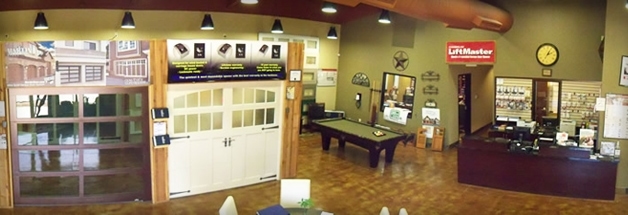How to Compare Garage Doors
When comparing garage doors it is important to consider a variety of factors beyond aesthetics. Overhead doors may look similar on the outside, but all garage doors aren’t created equal. With all the moving parts on garage doors, it is imperative that you gauge value by making sure your door options from different manufacturers are equivalent. Some garage door dealers will hide inferior parts in their door package. You end goal is figure out where your money is best spent and what each type of garage door is best suited for to your needs. Here are some questions and topics you should discuss with any garage door salesman before making a purchase.
Visit Several Showrooms
Never buy from an overhead door company that doesn’t have a showroom. You wouldn’t purchase a vehicle without test driving it – so why would you purchases a new garage door without seeing it in use? Most professional door dealers have doors on display with automatic openers to run them. See the doors in use and be up front with each company you deal with. Tell them your intentions to get multiple quotes from different companies. They will appreciate you honesty and realize that they are competing with rival companies for your business.
Get Multiple Quotes
Always shop for overhead doors through multiple companies – even if you have a referral from someone you trust. Competition always results in better service and lower prices. Call at least three different garage door dealers and get quotes on comparable model doors. After getting site unseen estimates over the phone, request on-site estimates on a written contract. Out of respect for your local businesses be sure not to schedule appointments all at the same time.
Warranty & Guarantee
During your visits to garage door showrooms ask about warranty information. Ask your sale representative these two specific questions; “Are your doors covered under a factory warranty?” “If I decide to have you install my door, what type of warranty do you offer on your labor?”
If your garage door salesman can’t answer these questions or doesn’t know the warranty information don’t buy from that company. All serious garage door professionals offer a minimum of a 6-month to 1-year warranty on their work. The manufacturer of the door installed should offer a lifetime warranty on the door against rusting, peeling and splitting. Lifetime warranties are defined by how long you own your home and non-transferable. Acts of God and forces of nature are not covered under any warranty.
Hardware Package
Some dealers setup their garage door packages in a way that offers quality garage doors with cheap hardware. Most of them do this to make extra profit on what is perceived by the market place as an equal product. Garage door hinges, rollers and track should be commercial grade. The thickness of the steel used is measured by gauge, with lower numbers of metal gauge indicating a heavier thickness. Always make sure you garage door hinges are 14-gauge or better. Some door companies offer 16-gauge or 18-gauge hinges as part of their package deal. These are insufficient and tend to breakdown quickly.
Rollers contribute to the overall noise factor of your garage door during operation. Always make sure you have white nylon rollers with ball bearings. In addition to noise reduction, ball-bearing rollers contribute to smooth operation of your during during travel through the track radius. This can reduce the chance of the door being damaged by binding up.
Torsion Spring Life Cycle
The standard amount of cycles for garage door torsion springs is 10,000. This translates to roughly 7-10 years based on average use. However, your dealer should be able to upgrade you to 20,000-30,000 cycles for little or no charge if you ask. Spring replacements are expensive at over $300 for a double spring repair. Paying $50 during the initial installation of your door for high cycle torsion springs will save you a lot of money in the long run.
Door Thickness & Gauge
Garage doors come in two common thicknesses of 2″ and 1 3/8″. While this may not seem like much of a difference it will be noticeable over the long term. The full 2″ thick door will last significantly longer and will be less prone to splitting, cracking and bending. Never purchase an 1 3/8 double car wide door as they tend to bend in the middle with the force of your automatic opener pulling on the top section.
Doors also have different degrees of gauge with 24 to 26 gauge being most common. The gauge of steel used on your garage door isn’t nearly as important on a double sided steel sandwich style door as it is on a single wall door. Always make sure your salesman tells you about thickness and the gauges of steel used on their doors so you can make equivalent comparisons.
Insulation R Value
If you intend to purchase an insulated overhead door you will need to confirm that you are comparing equivalent R Values. This becomes increasingly important in colder climates in northern states where heat loss is common. Two main garage door insulation types exist in the door industry, polystyrene and polyurethane. Think of polystyrene as a Styrofoam material and polyurethane as an injected foam material. The styrene insulation R rating of 9.00 is much less than a urethane insulated door of 17.50 – so make sure you are comparing apples to apples.



I write tutorials about garage door repair, installation and maintenance. With over a decade of experience in the overhead door industry I’ve learned a lot and I’d like to share my knowledge with you.